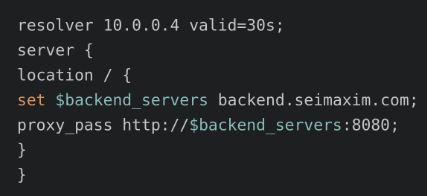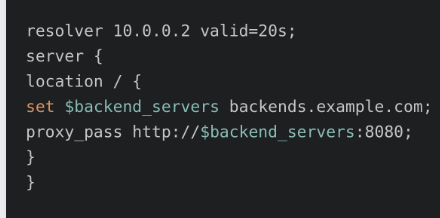Learn more about the valid flag in resolver in Nginx. Our Nginx Support team is here to help you with your questions and concerns.
NGINX Resolver Valid Flag | About
NGINX helps developers fine-tune various aspects of its behavior.
One such aspect is the resolver directive. It plays a key role in deciding how frequently NGINX resolves domain names.
Today, we are going to take a look at the “valid” flag within the resolver directive and how using variables for domain names can help with customization.
The valid flag in the resolver directive indicates the duration for which NGINX considers the answer from the resolver as valid and does not query the resolver during that period.
By setting a validity period, we can control how often NGINX recursively resolves the domain name, optimizing performance and minimizing unnecessary DNS queries.
For example:

Here, the resolver directive is set to 10.0.0.4 with a validity period of 30 seconds. This means that NGINX will re-resolve the domain name every 30 seconds, disregarding the Time-To-Live (TTL) provided by the DNS server.
Variable Usage for Dynamic Configuration
Using variables for the domain name in the proxy_pass directive enables dynamic customization of the resolution process.
In other words, when a variable is employed in proxy_pass, NGINX automatically re-resolves the domain name when the TTL expires, resulting in up-to-date information.

Here, NGINX dynamically resolves the domain name specified in the variable every 20 seconds. The resolver directive explicitly specifies the name server. Also, the valid parameter ensures NGINX re-resolves names at the specified frequency, ignoring TTL.
Handling Resolver Timeouts
To prevent potential delays, NGINX lets us set a resolver_timeout. This defines the maximum time it waits for a response from the resolver. If the resolver fails to answer within the specified timeout (e.g., 60 seconds), NGINX handles the situation. Hence, avoiding prolonged wait times and potential errors.
With the valid flag in the resolver directive and using variables in domain names in the proxy_pass directive, we can optimize NGINX configuration.
[Need assistance with a different issue? Our team is available 24/7.]
Conclusion
Today, our Support Engineers introduced us to the valid flag in the resolver directive in Nginx.
PREVENT YOUR SERVER FROM CRASHING!
Never again lose customers to poor server speed! Let us help you.
Our server experts will monitor & maintain your server 24/7 so that it remains lightning fast and secure.







0 Comments